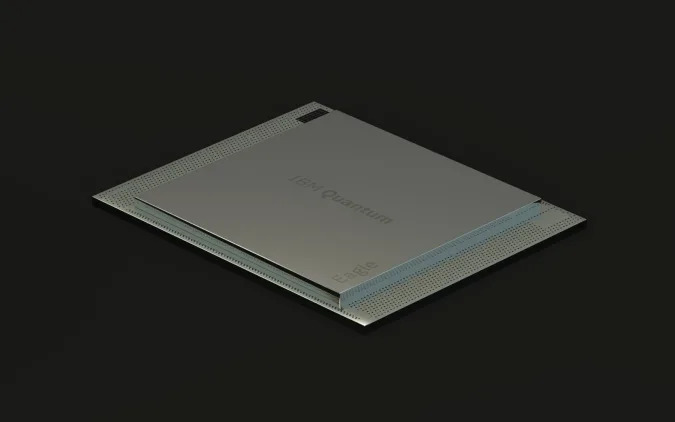IBM’s Eagle a 127-qubit quantum processor. International Business Machines (IBM.N) announced on Monday that it has developed a new quantum computing chip that, according to the company’s management, will allow quantum systems to begin outperforming classical computers in some tasks within the next two years. IBM is expected to unveil Eagle, a 127-qubit quantum processor, at the IBM Quantum Summit 2021, tomorrow (Nov. 16, 2021).
IBM said that its “Eagle” computing chip has 127 so-called “qubits,” which can represent information in quantum form. Classical computers work using “bits” that must be either a 1 or 0, but qubits can be both a 1 and a 0 simultaneously.
The Eagle quantum processor has nearly twice as many qubits as IBM’s previous largest quantum processor, the 65-qubit Hummingbird, which launched last year.
[email-subscribers-form id=”1″]
Jerry Chow, IBM’s director of quantum hardware system development, said that the company was still working to benchmark the performance of the new Eagle processor. He noted that IBM was not yet ready to say how long the Eagle’s qubits can remain in a quantum state or the degree to which the qubits are entangled.
He also mentioned that IBM would be introducing a new metric for gauging quantum performance called circuit layer operations per second, or CLOPS. This is significant because, unlike a conventional computer, a quantum computer does not produce a single, accurate output for a calculation. Instead, the result may change from one calculation to the next.

As a result, to arrive at a correct solution, the same computation must be done hundreds or even thousands of times via the quantum processor, with the distribution of results eventually converge on an accurate solution. In other words, if you conducted the identical computation 100 times and got answer A 85 times, then A is the correct answer, even if the quantum computer gave you answer B 15 times.
By the end of the year, firms that are members of IBM’s Q Network of early quantum adopters will be able to access the new Eagle processor via a cloud-based connection. The majority of these corporations, including Toyota, Wells Fargo, and Delta Air Lines, have been experimenting with quantum computers and performing tiny proof-of-concept projects, but have yet to use quantum computers in any real business units.
Back in 2020, IBM had announced its plan to reach 1,000 qubits or more by 2023. It is an ambitious mission that recognizes that incremental increases in qubit counts and more sophisticated algorithms will not deliver Quantum Advantage—the point at which certain information processing tasks can be performed more efficiently or cost-effectively on a quantum computer than on a classical one.
A qubit is the basic unit of quantum information, analogous to the bits of classical computing. IBM aims to aims to take the technology from today’s noisy, small-scale devices to the million-plus qubit devices of the future. Quantum computers will need to make significant progress if they are to help business and research groups address some of the world’s most pressing problems in industry, government, and research.
Inside a massive dilution “super-fridge,” IBM quantum scientists are developing Condor, a quantum computer with a 1,121-qubit processor. By 2023, a quantum computer based on the Condor processor will be online and capable of exploring Quantum Advantage. Internally nicknamed “Goldeneye,” the 10-foot-tall and 6-foot-wide super-fridge is a dilution refrigerator larger than any commercially available today.
Condor lays the framework for scaling to completely error-corrected, networked quantum computers with a million or more qubits. The examination of historically intractable issues will be possible for a variety of industries, including banking, chemistry, and AI, thanks to these multi-million-qubit super-fridges connected by intranets.
Eagle has a unique configuration that will enable for expanding the number of qubits that work together as logical qubits – the “fault-tolerant” qubits required to achieve Quantum Advantage.
In 2022, the 433-qubit “Osprey” processor will succeed Eagle. Osprey continues to push the limits of fabrication techniques in order to create a smaller chip with more logical qubits while maintaining performance. Its more efficient and compact controllers, as well as its cryogenic infrastructure, will ensure that scaling up future computers does not compromise individual qubit performance, introduce additional sources of noise, or take up excessive space.

